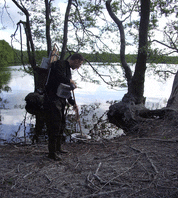Senior scientist Christian Skov, DTU Aqua and colleagues from Lund Universitiy, Sweden and Eawag, Switzerland now present direct evidence that migrants benefit by evading predators.

The biologists tagged more than 2000 individual fish (roach, Rutilus rutilus) in two Danish lakes over 4 years and monitored migratory behaviour using passive telemetry. Next, they calculated the predation vulnerability of fish with differing migration strategies, by recovering data from passive integrated transponder tags of fish eaten by cormorants (Phalacrocorax carbo spp.) at communal roosts close to the lakes. The results have just been published in Biology Letters.
The extensive field study shows that migration in a freshwater fish like roach that commonly migrates from lakes to streams during winter, confers a significant survival benefit with respect to cormorant, predation.
“Our study show that fish can reduce their predation risk from cormorants by migrating into streams, and that the probability of being preyed upon by cormorants is positively related to the time individuals spend in the lake during winter,” says lead author, senior research scientist Christian Skov, DTU Aqua, National Institute of Aquatic Resources, Denmark:
“Our data add to the growing body of evidence that highlights the importance of predation for migratory dynamics, and is one of the first studies to directly quantify a predator avoidance benefit to migrants in the field.”
The research was financially supported by the Danish National Fishing Licence Funds, Formas, Swedish Research Council and a Marie Curie EU fellowship (FP7).
May 2013



